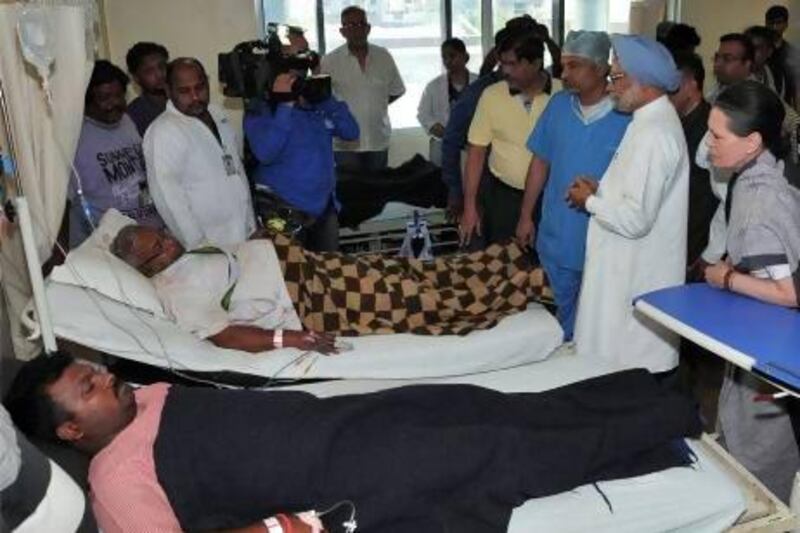NEW DELHI // India's politicians displayed a rare show of unity in condemning an attack on Saturday by suspected Maoist guerrillas that killed 27 people travelling in a convoy carrying leaders and members of the Congress party.
The evening ambush on a rural road in the insurency-wracked state of Chhattisgarh, which targeted the group returning from a campaign event with the area's indigenous tribal community, appeared to be a warning to officials to stay away from the rebels' main base of support.
Among the dead were Mahendra Karma, a prominent tribal leader. Yesterday, security forces discovered the bodies of local Congress politician Nandkumar Patel and his son Dinesh, who had been abducted during the ambush. Another 32 people were injured.
"It is not the time to do politics … This is not an attack on Congress. This is an attack on democracy," said Rahul Gandhi, the vice-president of the Congress party, who yesterday arrived in Raipur, the state's capital.
Rajnath Singh, head of the opposition Bharatiya Janata Party (BJP), said the country should unite in its fight against the insurgency by Maoists, also known as Naxalites after the West Bengal village of Naxalbari, where the guerrilla movement began in 1967.
" I want to appeal to all political parties that, whether it is Naxalism or terrorism, we need to rid the country of these issues, rising above party politics," he said in New Delhi.
Even Narendra Modi, the divisive, Congress-baiting BJP leader who is chief minister of Gujarat, said on his Twitter feed: "The need of the hour is to stand together as a nation and vow to fight this menace that threatens our democracy."
The Press Trust of India news agency said the attackers blocked the road by felling trees, forcing the convoy to halt. Police said the suspected rebels triggered a land mine that blew up one of the cars, then fired at the Congress party leaders and their supporters before fleeing.
"Our country will never bow down before Naxalism. Those who commit such dastardly crimes are working against the interests of peace and development in the area," the prime minister, Manmohan Singh, said in a statement.
Mr Singh announced government payments of 500,000 rupees (Dh33,000) for the families of each slain person as well as 50,000 rupees for each of the injured. The home ministry has also dispatched additional units of paramilitary forces to the state, to boost security.
Congress, the main opposition party in the state, has recently stepped up political activities, trying to win the support of tribals ahead of state elections scheduled to be held by December.
Saturday's attack is thought to have been engineered primarily to kill Mr Karma who, in 2005, helped to establish the Salwa Judum, an anti-Maoist militia of young tribals armed and trained by the government. The Salwa Judum has been accused of violating human rights, recruiting and arming minors, and killing or wounding civilians.
In 2011, the Supreme Court called the Salwa Judum unconstitutional, but Rahul Pandita, whose book Hello, Bastar: The Untold Story of India's Maoist Movement was published that year, said the organisation continues to work covertly.
"In the history of the Maoists, once you're a target, they don't leave you," Mr Pandita told The National.
Sudeep Chakravarti, an analyst of conflict situations and the author of Red Sun: Travels in Naxalite Country, published in 2008, said the Maoists had been trying to kill Mr Karma for many years. As recently as November, he escaped a land-mine explosion.
"I've been to his home village," Mr Chakravarti said. "I've seen his house. It's heavily guarded, and there's a police post nearby. And he gets very high security."
The creation of the Salwa Judum, Mr Chakravarti said, was one of the rare instances in which the Congress and the BJP saw eye to eye. The Salwa Judum was formed by the BJP government in Chhattisgarh with the tacit blessing of the Congress-led federal government.
The rebels, known as Naxalites, have been fighting the central government for more than four decades, demanding land and jobs for tenant farmers and the poor. They are now present in 20 of India's 28 states and have thousands of fighters, according to the home ministry.
The government has offered to begin peace talks, but without success. The Maoists demand that it first withdraw thousands of paramilitary soldiers deployed to fight the rebels.
Maoist rebels carried out two major attacks in Chhattisgarh in 2010. They ambushed a paramilitary patrol in April that year, killing 76 troops in their deadliest attack ever. A month later, they triggered a land mine under a bus carrying civilians and police, killing 31 people.
In a column he wrote in the Mint newspaper on Thursday, Mr Chakravarti pointed out the "deeply sulky tone" of recent Maoist statements. He quoted a statement released after the killing of 10 guerrillas in early April, which accused the "fascist" government of plotting "this gruesome mass killing".
"Not too long ago, such rant would quickly be followed by a major revenge hit," Mr Chakravarti wrote in the article, in which he also said the Maoists were now a weakened force.
But Saturday's attack "shows that the Maoists are still capable of unleashing and perpetrating a successful operation where they kill everyone", Mr Pandita said. Despite the advances made by Indian security forces into territory that had once been held by Maoists, he said, "they have not been eliminated completely".
Congress party president Sonia Gandhi yesterday visited some of the injured in hospital.
"We are devastated," said Ms Gandhi, who denounced what she called a "dastardly attack" on the country's democratic values.
ssubramanian@thenational.ae
sbhattacharya@thenational.ae
with additional reports from the Associated Press





